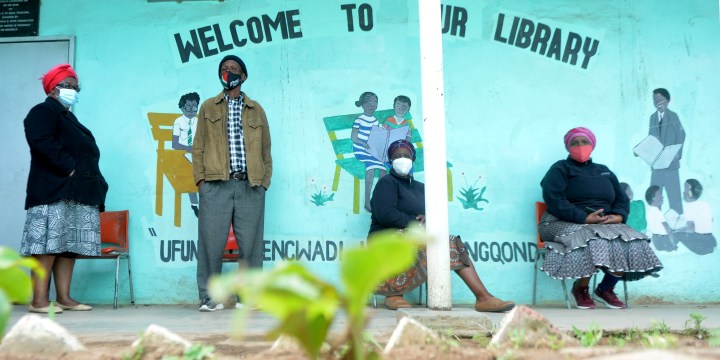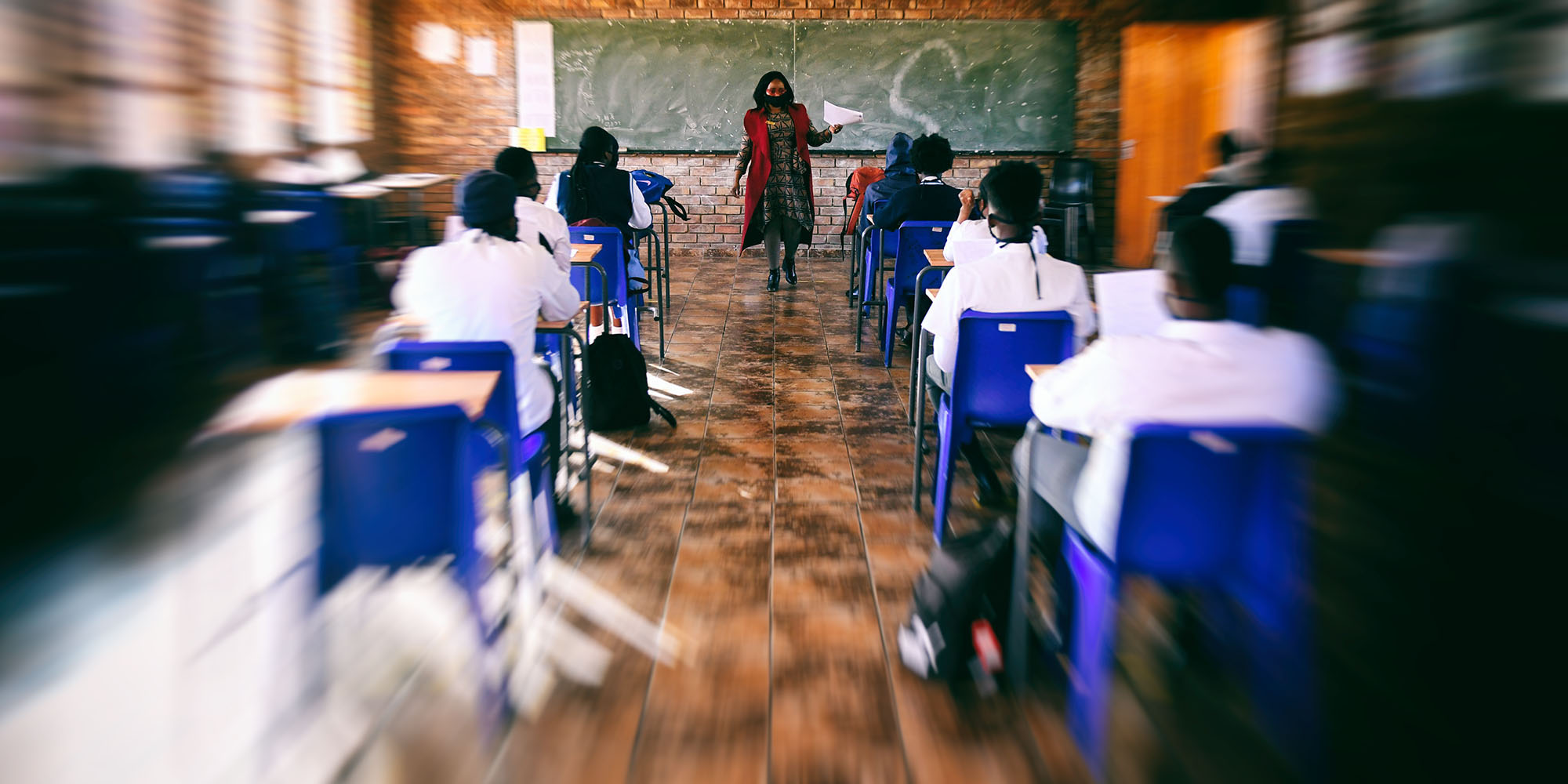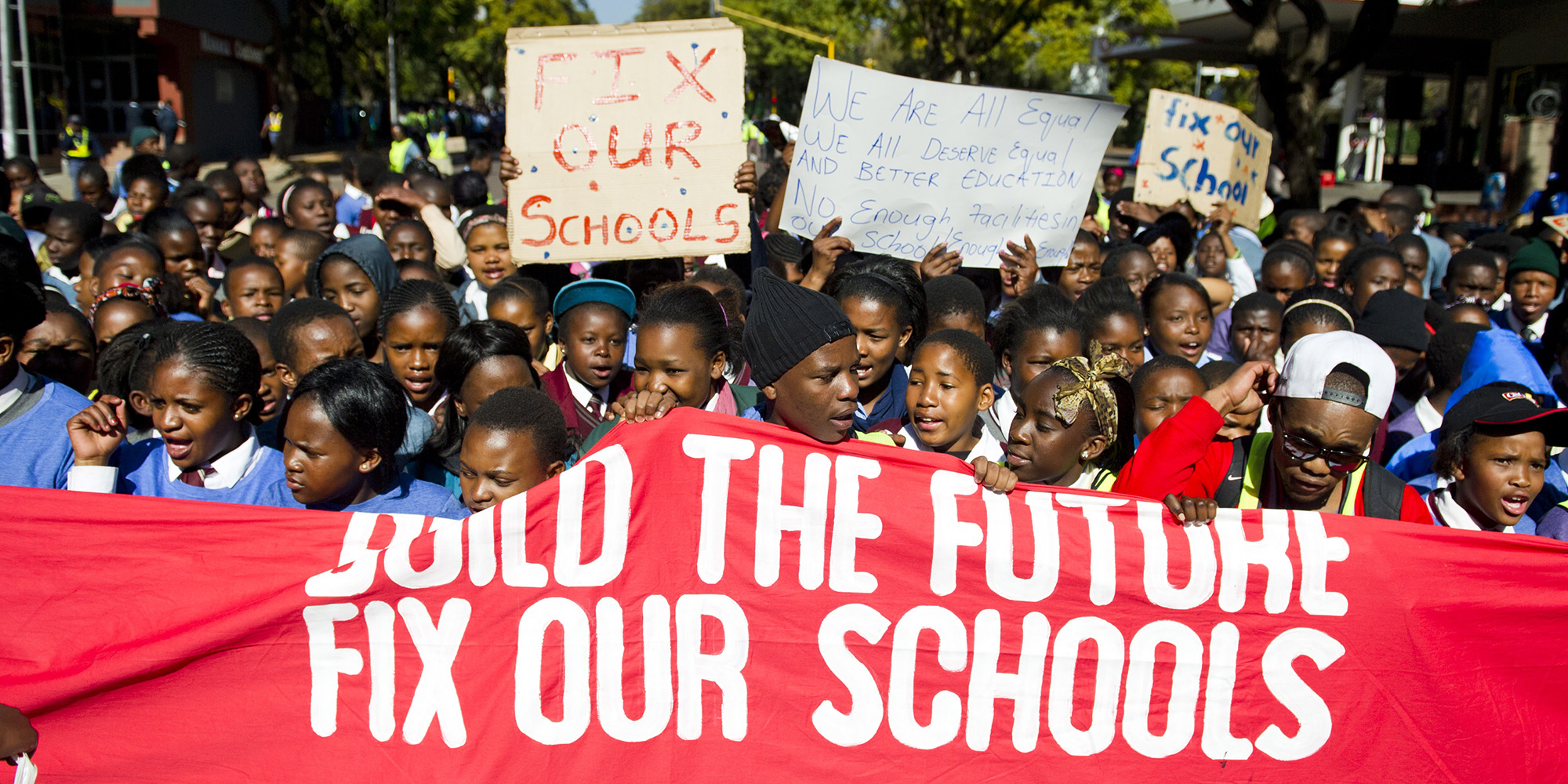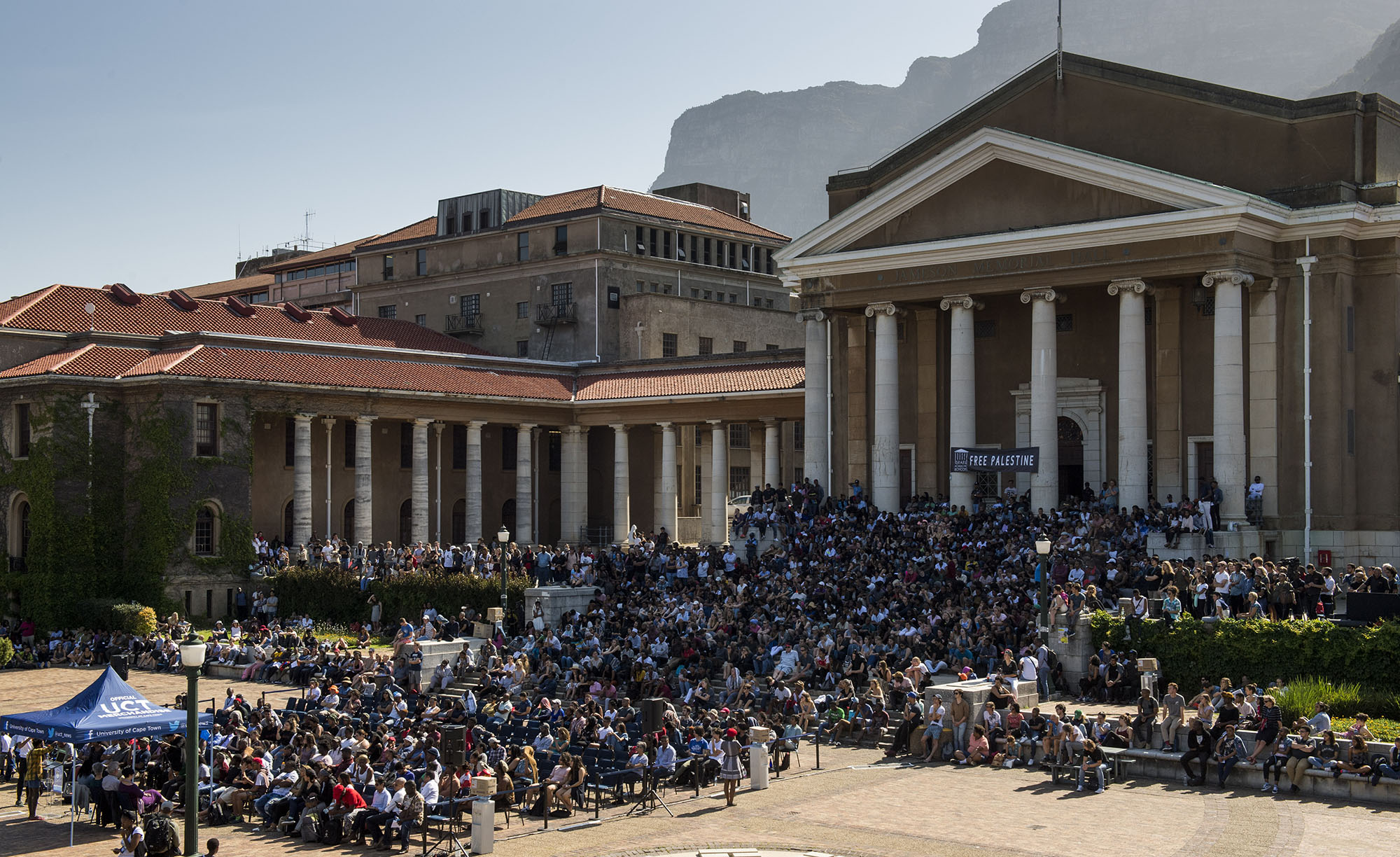BLUEPRINT FOR RECOVERY 2024
Part 3: ‘There is no education system that can be better than the quality of its teachers’

In 2017, Pravin Gordhan urged South Africa to ‘join the dots’ between corruption and the Zuma administration. John Matisonn joins those dots in this eight-part series. In this instalment, he borrows the phrase of James Carville, who coined the US election theme, ‘It’s the economy, stupid’, and concludes that in education, ‘It’s the teaching, stupid’.
Also read Part 1 and Part 2.
The government has failed to take advantage of tested, research-based educational solutions provided by South African educationists to improve a relatively high-budget, low-performance education system.
Two key immediate steps the new minister must take in 2024 to turn around our poor education outcomes rapidly are putting teacher assistants into classrooms, and mobilising every possible resource to build a culture of books and reading into every home and school from early childhood.
Once a culture of activism and reform is entrenched by a minister who is open to new initiatives, the numerous local groups doing education work should be welcomed.
Step 1: Books and a reading culture
A new education minister can make dramatic strides by championing a culture of reading and learning, publicly and consistently. Don’t discriminate: anybody who will help should be embraced. There is enormous public goodwill to be tapped.
The first 1,000 days of life are when a child’s brain develops the fastest. Listening to stories and playing are essential parts of a child’s development to get the best start in life. Yet research by Unicef and the Department of Basic Education found that even in households with access to some books, only 32% of caregivers reported reading regularly to young children. Many of them say babies and toddlers under the age of two years are too young for books and play.
This attitude, and the fact that 43% of South African households with young children do not have a single book in the home, and only 16% have more than five, is an early indicator that our outcomes will be poor.
Basic Education Department statistics show that more than 17,000, or 70% of public schools, do not have libraries – and, of those that do, more than a third (2,133) are not stocked.
This can be changed. Promoting reading and storytelling from an early age is the first step to cut the figure of 81% of South Africa’s Grade 4 children who cannot read for meaning. Reading for meaning refers to the ability to extract meaning from a section of text, and is a vital skill a child needs to progress through the school curriculum.
Making teaching assistants available will be achieved in several ways. The first is by reversing the time trainee teachers spend in undergraduate courses versus the time spent in classrooms.
A national campaign to add books to schools and households can inspire the nation around shared ambitions, in which every community can contribute.
It should be a national project to bring books to the centre of education from infancy, championed publicly by the minister of education, and should include removing VAT on books, and calling on the government, charities, philanthropists and well-meaning citizens to donate books to deprived schools, to libraries and to households.

Western Cape education MEC David Maynier said that despite the department having managed to place more than 50,000 pupils in grades 1 to 8, the provincial education system was ‘under severe admission pressure’. (Photo: Gallo Images / Beeld / Deaan Vivier)
Studies show that mother-tongue instruction for the early years of school produces the best results. But many parents object because they see English as the gateway to jobs and prosperity. The minister must publicly encourage the creation of new children’s books in African languages as well as English, stimulating publishers and authors to increase output and parents and teachers to use them.
Only 28.5% of children aged 0 to four years attended an early childhood development (ECD) programme in 2021. While developing long-term plans to roll this out, the Department of Basic Education should commit to providing all ECD centres with a basic minimum package of books, and all foundation-phase classrooms should have a minimum 100-book library.
Most school children do not have the basic texts needed to learn to read in their home language at school or at home. This can be remedied using low-cost anthologies of graded readers – a set of about 20 sequenced stories aimed at teaching children to read in their home language that costs R15/book/child.
Research in Limpopo shows that equipping pupils with workbooks and teachers with teacher guides, in addition to four days of face-to-face training per term, led to a 60% learning increase compared with business-as-usual schools.
When the Eastern Cape Department of Education rolled out anthologies of graded readers, for reading outcomes in isiXhosa, the children who received them improved compared with previous cohorts in the same schools who did not. Rolling out anthologies of graded readers to all Grade 1-3 children is a priority.
Using Open Access books and printing at scale can keep costs in check.
Step 2: The teaching assistant solution
As founder of Future Nation Schools Sizwe Nxasana says, “there is no education system that can be better than the quality of its teachers”.
Proficiency levels of South African teachers (41%) rank far below that of their peers in Kenya (95%) and Zimbabwe (87%). Studies show that compensating for weak teaching skills draws results. This will also help reduce South Africa’s teacher absenteeism rate which is the highest of all SADC countries.
The biggest direct intervention to enhance the quality of teaching will come from bringing teacher support into the classroom, because four out of five teachers in public schools lack the content knowledge and pedagogical skills to teach their subjects. The proven remedy is to add suitable teaching assistants into poorly performing schools, guided by an experienced mentor.

Equal Education members march to the Department of Basic Education offices on 17 June 2013 in Pretoria, demanding that Basic Education Minister Angie Motshekga publish minimum norms and standards for school infrastructure. (Photo: Gallo Images / Foto24 / Alet Pretorius)
The Department of Basic Education’s Early Grade Reading Study (EGRS) shows that reading outcomes of Grade 1-3 pupils improve after at least two years of an expert reading coach supporting and visiting teachers in the schools.
Teaching assistants help teachers and pupils. Making teaching assistants available can be done at minimal cost. This is the biggest single, short-term intervention that will show results rapidly.
Making teaching assistants available will be achieved in several ways. The first is by reversing the time trainee teachers spend in undergraduate courses versus the time spent in classrooms.
Education Professor Jonathan Jansen recommends 70% of each day is spent teaching, and 30% back in teachers’ college or university classrooms learning lessons from the day’s teaching and enriching what is learnt in practice with the understanding that concepts and theory enable effective learning.
Jansen says the system has been tested elsewhere. That one move would be transformative. Once the principle is adopted, it will be possible to tap the goodwill of ex-teachers and others with skills to participate.
Unemployed graduates should be offered a year as a teaching assistant. Many retired teachers are willing to assist. (See the success of the MathMoms project below). Where appropriate, skilled foreign teachers should be deployed as mentors or trainers to help lift capacity.
Universal testing for teachers is essential. Teachers must write exams, be subjected to assessments to ensure they have the necessary content knowledge, and trainers must have recent relevant experience at the level at which they train.
To improve mathematical foundations teacher evaluations will be required. In nearly half of all South African secondary schools not a single child could achieve the intermediate benchmark in an international mathematics assessment. By contrast, in Botswana only 2% of schools performed this badly.
Resistance should be expected, but the principle of politics-free schools must be put on the table.
Community-based initiatives that harness underused skills can be extremely effective. MathMoms, a women’s initiative launched in Elsies River, Cape Town, deploys retired teachers to mentor parents to work to improve children’s maths skills with positive results. It has since spread to many other communities.
There are many other successful community-based initiatives, and the lessons they have learnt must be passed on and adopted. There are free courses available from Google and others. Always encourage learning!
The government must stop thinking that throwing money at the problem is enough; it needs to offer support and guidance to the entire school system and hold everyone to account, so they provide what is expected of them.
Step 3: Teachers’ unions
Contributing to South Africa’s poor showing in learner indices compared with some poorer African countries is the dysfunctional relationship between the government and the South African Democratic Teachers’ Union (SADTU).
A new vision in government can and must re-programme this relationship despite the political risks involved. It can’t all be done at once.
SADTU was born out of a genuine need to resist racist and authoritarian white inspectors who abused their power over teachers’ careers. But after 1994, SADTU gained inappropriate power within both the ANC and education departments at the expense of the educational interests of learners.

University of Cape Town students gather during a campus meeting on 1 November 2017. More than 1,000 students gathered at the Jameson Plaza to discuss issues of free education. (Photo: Gallo Images / Netwerk24 / Jaco Marais)
A 2016 ministerial task team reported that positions like principal and deputy principal were being sold for money, sex or livestock. It also found that SADTU was “in de facto charge of the management, administration and educational priorities” in at least six of the nine provinces. This sidelines quality applicants unwilling or unable to pay these bribes.
Education experts confirm that it is both essential and possible to rebuild a culture that is focused on learner outcomes. Many teachers and SADTU members do care about the quality of education they provide. They must be sought out and empowered to reprioritise educational excellence to raise performance systematically and sustainably.
Resistance should be expected, but the principle of politics-free schools must be put on the table. What should teachers’ ethics say about party political work done in school hours and on school property? Should teaching be seen as an essential service?
If teachers perform an essential service, they cannot be permitted to strike. The way we select, train, support and incentivise teachers will have to be revised.
Second, is it healthy for school principals to be office bearers of political parties? Is the practice of teachers attending to party political matters during school hours or on school property, using school facilities, wise?
For any who doubt a radical new paradigm is required, there are reams of statistics pointing to the extent of our failure. South Africa is at or near the bottom of world education outcomes indices. We rank eighth in the world in terms of education spending as a percentage of GDP, yet close to last for output, of those that provide reliable statistics.
A child can learn more under a tree with a good teacher than from an untrained teacher in a pristine building.
We also perform worse than many poor African neighbours who spend a fraction of what we do on education per capita. Solutions have to focus more on the “soft” issues causing poor educational outcomes than on increased funding.
When almost a third of learners halfway through their second school year (Grade 2) do not know all the letters of the alphabet, and fewer than half of Grade 6 learners tested could achieve the Grade 3 benchmark in reading fluency, we are in a crisis.
It represents a devastating disregard for our responsibilities to the next generation, as well as a national humiliation. It happened under the noses of our teachers, education departments, political parties, government – and parents. Not another day should be lost in tackling this wasteland.
We have lost a decade of progress; the average Grade 4 child in South Africa is three years behind their Brazilian counterpart. These measures will show results and help restore citizens’ sense of priorities.
My emphasis has been on the soft issues of teaching and learning intentionally. A child can learn more under a tree with a good teacher than from an untrained teacher in a pristine building. To borrow the phrase of US campaign expert James Carville, who coined the election theme, “It’s the economy, stupid”, in education “It’s the teaching, stupid.”
Still, physical conditions in many schools are not acceptable. Someone needs to be named to take responsibility for the quality of buildings, and to resolve the problem of empty schools, including many Nelson Mandela raised money to build.
By mid-2023 there remained 3,300 schools still using pit latrines, in which small children have died. For pity’s sake, can we not end this rapidly, by putting one person in charge and accountable in public, until it’s done? The budget for 4,000 schools was R10-billion, which seems more than generous.
Since most schools without proper toilets are in rural areas, where the average school size is fewer than 500 learners, the amount of about R2.5-million per school seems excessive. An audit committee should be asking searching questions.
Tertiary education
Over the past decade or more, South African tertiary institutions have become chronically unstable. Years of poor decisions, political interference, underfunding and lax administration allowed growing corruption and deviation from the principles that should embody a culture of learning and prepare young people for fulfilling employment.
South African universities’ world ratings have fallen substantially. The world rating of the country’s top university, UCT, fell from 107th in 2010/11 to 171st in 2018. Others fared similarly. Though ratings systems have limitations, a growing body of literature confirms the dire decline and the rise of corruption.
The decline has not been universal. Stellenbosch University and the University of the Western Cape are notable exceptions where substantial improvements have been identified.
Technical training has been downgraded and South Africa lacks a functional apprenticeship system. It needs to be rebuilt.
But a considerable number of universities, both rural disadvantaged ones and well-resourced formerly white institutions, have seen serious malfunction among vice-chancellors, chairs of council, members of parliamentary portfolio committees, union leaders, student leaders, registrars, deans and professors.
It is a national embarrassment that a university is put under administration. Though the politics of universities have become difficult, they teach far more students without a matching increase in funding. But the really bad examples seem to be fuelled by chronically weak leadership.
A new minister must set the values expected of institutions, including academic excellence, integrity and the principles of academic freedom and inclusion that treats all students and staff as equally valuable, regardless of their nationality, race, or other identities. A culture of leadership by university vice-chancellors needs to be guided by these values of selfless service.
Regardless of their political affiliations, the minister, vice-chancellors and other university leaders must build a non-political atmosphere of leadership entrenched in the values of academic freedom, excellence and inclusion. The minister is responsible for embodying and enforcing those principles.
Technical training has been downgraded and South Africa lacks a functional apprenticeship system. It needs to be rebuilt. The minister must demonstrate the respect for the value of technical careers they deserve. They are vital to rebuilding the economy and reversing the slide of deindustrialisation by opening doors to good income and fulfilling lives.
The new minister needs to lead the way in championing the vital role of trade skills in rebuilding manufacturing, construction and reviving infrastructure to improve the quality of life and job creation in the real economy. DM
Next: Crime and Security: From elite pampering to stopping crime


















Lots of good stuff here. But the university rankings comments don’t seem to hold up to the data. Though UCT did drop in the THE ranking as described, Stellenbosch has not improved according to the same metric, and no numbers are cited to see what the improvement described is…
Let’s work together using the resources we have, including all the talent of committed people to help our education system heal and grow.